Blog
World Refugee Day 2020
June was first declared as World Refugee Awareness Month in 2001 culminating in World Refugee Day June 20th. Since then, June has been a time to acknowledge strength, courage, perseverance and resilience of millions of past and present refugees who live around the globe, including here in Memphis!
Refugees are men, women, children who have been forced to leave their home country due to war, conflict, credible fear of persecution (due to race, nationality, religion, political opinion or social group). Today more than 25.9 million people have refugee status, and another 41 million are internally displaced.
But when invited to a final country for permanent resettlement, these neighbors are welcomed into community, provided vital services, and thrive when given the opportunity to embrace a life of peace, freedom, education, employment, and serving their communities.
Do you wish to learn more about the current refugee crisis? Considering we can’t host an event in person this year, this is a great opportunity to invite family and friends to watch the same film or read the same book remotely, then discuss over Zoom, Facetime, What’s App, or more! Other things to do this week include:
- talk with a refugee friend
- order take out from an immigrant-owned restaurant (like Global Cafe or Naguara Home Made Food!)
- partner with us by giving or volunteering
- learn a phrase in the language of your refugee friend
- call or write state and national senators to advocate on behalf of refugees
- share with someone why you welcome refugees!
Here are some reading/listening/watching recommendations – LOTS to choose from this week or this summer:
Reading List
Books on the Refugee/Immigrant Experience
A Hope More Powerful Than the Sea: One Refugee’s Incredible Story of Love, Loss, and Survival by Melissa Fleming
Between Shades of Gray by Ruta Sepetys
Brothers of the Gun – A Memoir of the Syrian War – by Marwan Hisham
Call Me American by Abdi Nor Iftin
City of Thorns by Ben Rawlence
Displaced: Refugee Writers on Refugee Lives by Viet Thanh Nguyen
Enrique’s Journey by Sonia Nazario
Exit West by Mohsin Hamid
Homes: A Refugee Story – by Abu Bakr al Rabeeah
Seeking Refuge by Stephen Bauman, Matthew Soerens, and Dr. Issam Smeir
Sweetness in the Belly by Camilla Gibb
The Amazing Adventures of Kavalier and Clay by Michael Chabon
The Bee Keeper of Aleppo: A Novel by Christy Lefteri
The Boat People by Sharon Bala
The Fox Hunt: A Refugee’s Memoir of coming to America by Mohammed Al Samawi
The Girl Who Smiled Beads by Clemantine Wamariya
The Good Immigrant: 26 Writers Reflect on America by Nikesh Shukla
The Monk of Mokha by Dave Eggers
The Newcomers by Helen Thorpe
The Refugees by Viet Thanh Nguyen
The Ungrateful Refugee: What Immigrants Never Tell You by Dina Nayeri
To Stop a Warlord by Shannon Sedgwick Davis
We Crossed a Bridge and It Trembled: Voices from Syria by Wendy Pearlman
Welcoming the Stranger by Jenny Yang and Matthew Soerens
What is the What by Dave Eggers
Graphic Novels on the Refugee/Immigrant/Asylum Seeker Experience:
Illegal by Eoin Colfer
The Best We Could Do: An Illustrated Memoir by Thi Bui
The Unwanted: Stories of the Syrian Refugees by Don Brown
Undocumented: A Worker’s Fight – by Duncan Tonatiuh
Zenobia – By Morten Durr
When Stars are Scattered by Victoria Jamieson and Omar Mohamed (Published April 14, 2020)
Books for Young Adults
A Land of Permanent Goodbyes by Atia Abawi
A Long Walk to Water: Based on a True Story by Linda Sue Park
Escape from Aleppo by N. H. Senzai
How Dare the Sun Rise: Memoirs of a War Child by Sandra Uwiringiyimana
In the Sea There are Crocodiles by Fabio Geda
Nowhere Boy by Katherine Marsh
Outcasts United: An American Town, a Refugee Team, and One Woman’s Quest to Make a Difference by Warren St. John
Refugee by Alan Gratz
The Night Diary by Veera Hiranandani
The Red Pencil by Andrea Davis Pinkney
We Are Displaced: My Journey and Stories from Refugee Girls Around the World by Malala Yousafzai
Children’s books
Four Feet, Two Sandals by Karen Williams and Khadra Mohammed
My Two Blankets by Irena Kobald
Sea Prayer by Khaled Hosseini
The Journey by Francesca Sanna
I’m New Here by Anne Sibley O’Brien
MOVIES AND DOCUMENTARIES
AMAZON PRIME
After Spring
Climate Refugees
Dheepan
For Sama
God Grew Tired of Us
Human Flow
Refugee
Salam Neighbor
The Good Lie
HULU
Hotel Rwanda
Safe Harbour
NETFLIX
Born in Syria
Fire at Sea
First They Killed My Father
Living Undocumented
PBS
Exodus & Exodus: The Journey Continues
YOUTUBE
OTHER
Share your book or movie reviews on Facebook, Twitter or Instagram and tag us: @wrmemphis.
Asylum Program |Programa de Asilo
What is World Relief’s Asylum Program? | ¿Que es el Programa de Asilo?
World Relief Memphis offers the following support programs to individuals and families granted asylum into the United States.
World Relief Memphis ofrece los siguientes programas de apoyo a individuos y familiares que han obtenido el estatus de asilo en los Estados Unidos.
Employment Services | Servicios de Empleo
We work with clients to navigate the American workplace, taking steps together toward career development and successful integration through job application assistance, goal setting, and job referrals.
Trabajamos con clientes para navegar el estilo de trabajo Americano, tomando pasos juntos hacia el desarrollo professional y exito en integracion a través de asistencia en aplicaciones de trabajo, crear metas, y recomendaciones de trabajo.
Connect Language Center
We offer quality, accessible English courses which are available in the morning and evening. There are classes from beginner to advanced levels.
Ofrecemos cursos de Inglés con calidad accesible los cuales están disponibles en la mañana y noche. Estas son clases con niveles desde principiantes hasta avanzados.
Other Services | Otros Servicion De Apoyo
Schedule a consultation appointment to learn about eligibility for additional support services, including cash assistance, medical insurance, healthcare, navigation, and case management.
Programe una cita de consultacion para aprender acerca de la eligibilidad para servicios adicionales de apoyo. Que incluyen asistencia en efectivo, seguro medico, asistencia medica, navegación y manejo del caso.
For more information CONTACT Skarleth Tyler at: | Para más información contáctenos como:
901-341-0220
Please share with friends!
Building a Better Future
Aise Nature Bahonda and Emily Yope are proud to be a part of the refugee community here in Memphis. I had the opportunity to sit down with them and discuss their story and their aspirations for the future; doing so in hopes to encourage other new commers to this city and to remind others of the importance of supporting this resilient group of people.
Both coming from the Democratic Republic of Congo, these teens described fond memories of their life in their hometowns as children such as playing soccer, hanging out with friends, and constructing slingshots. However, they do remember the trials as well. Aise recalled the struggle of travelling miles to get fresh water and the poor treatment he received in school. With conflicts rising in their country, their families were displaced and contacted by IOM (International Organization for Migration). Emily specifically noted that traveling to and from IOM’s location was extremely difficult as it was over three hours from their home. For her, the refugee process took over three years. Aise, who was four when the process started, recalls the loads of paperwork his family had to complete, and the numerous questions queried to them. For both, it was exhausting and intimidating. The trials only continued once their journey commenced.
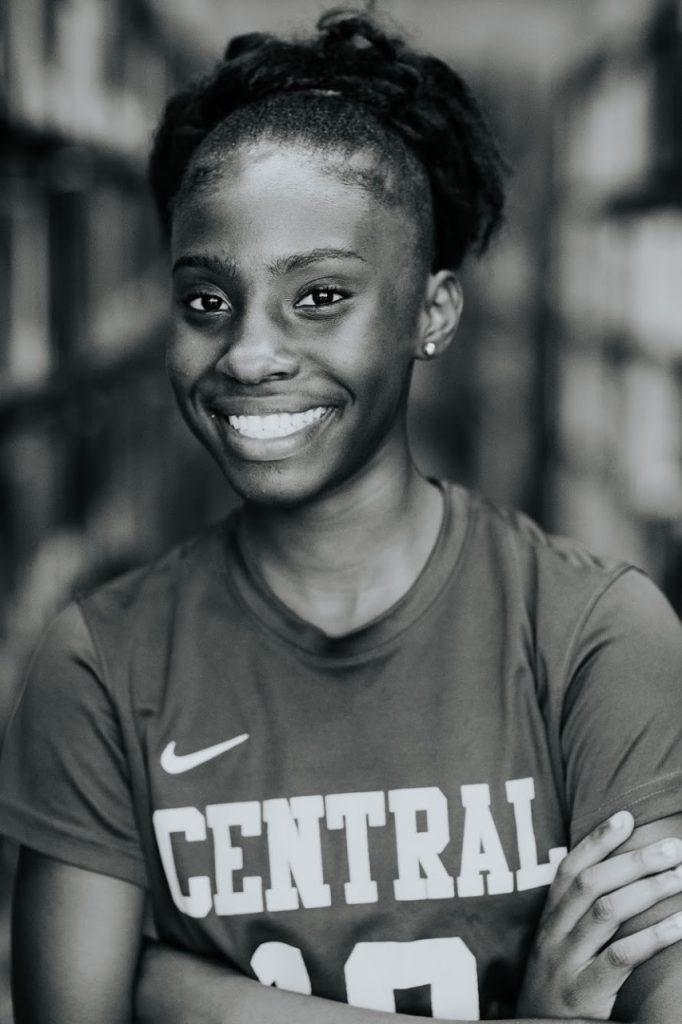
When asked about the emotion of the moment, Emily stated, “I didn’t know anyone or how to live there (in America) so I kind of freaked out. When our friends left us (resettling in a different city), it was so painful.” Pushing through however, they were greeted in Memphis by World Relief who wasted no time in settling them in their new home. Although his dad was the only one who knew basic greetings in English, Aise stated he felt relieved when they arrived at their Memphis house. In fact, his favorite moment was “the huge table of food!” For Emily, she was relieved to see the diversity of the city of Memphis. She told me she worried they would be outsiders here, but upon arriving quickly met other people from her country which alleviated some of the initial culture shock. From there, World Relief began helping them with their application processes for their Social Security cards, getting them enrolled in school, and much more.
Learning English was the most difficult challenge to overcome as the students adjusted to school in America. “It was difficult when I was used to being at the top of my class back home, then coming here and not understanding anything my teachers said. I had no idea what to do,” remembers Emily. English as a Second Language (ESL) classes and after school tutoring at Refugee Empowerment Program helped her to regain confidence by about seven months in school. Simultaneously, Emily is keen to keep fluent in her home languages of Swahili and French, and volunteers to interpret for others at church and in her community. Aise chooses to stay fluent in Lingala as well, and practices regularly by visiting with cousins and family over various apps.
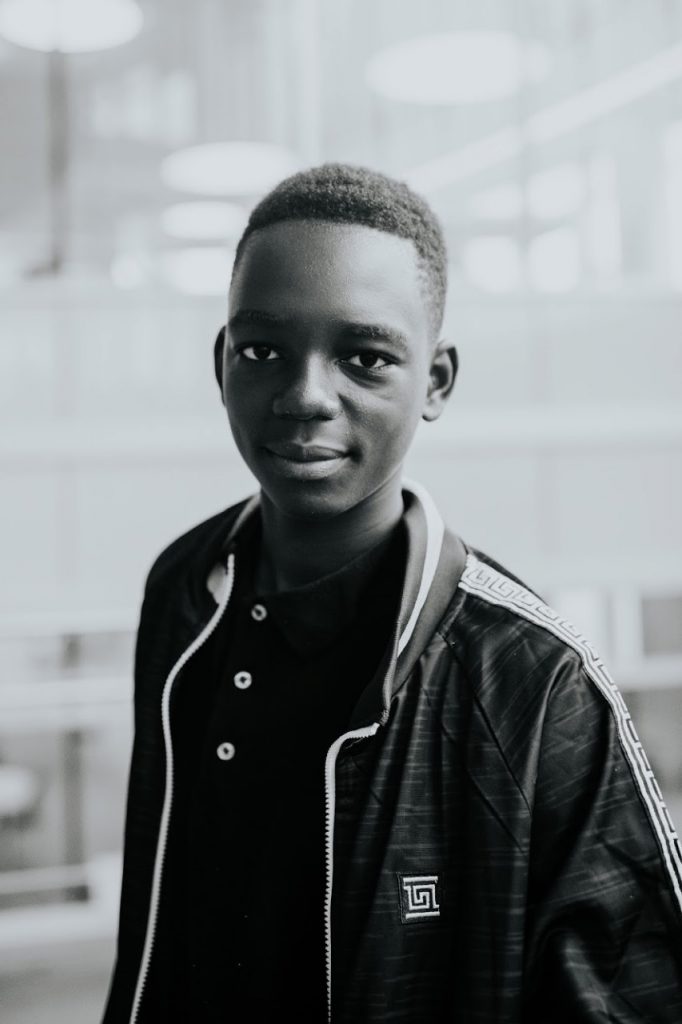
Now, both are thriving in school and are excited for the future. Emily is a senior at Central High-School and Aise is a sophomore on Central’s varsity soccer team. Emily’s dream is to be a cardiologist while Aise’s is to be a surgeon. When asked why, both stated they have a passion to help others. Emily was inspired by the death of a cousin who couldn’t get the cardiac surgery needed. Aise described his motivation: “Where I grew up I saw a lot of people in pain and it was hard to get medical treatments. I just want to give back the favor. I hate seeing death. I want the world to be full of light and peaceful.” With World Relief’s continued support coupled with their ravenous work ethic, their dreams will become a reality, which will be another small step in building a better future for the next generation.
Story: Nathan Spencer
Photos: Emily Frazier
===============
June is #ImmigrantHeritageMonth and #RefugeeAwarenessMonth, and as we count down to World Refugee Day June 20th, we will be featuring stories of courage, resilience, and hope among our refugee and immigrant community. Follow us on Instagram, Facebook and Twitter at @wrmemphis.
To contribute to our work, visit worldrelief.org/memphis/get-involved/covid-19.
Nathan and Emily volunteer for World Relief as copywriter and photographer. To learn about volunteering with us, visit Volunteer Opportunities.
Beautiful Things Follow Prayer
In tumultuous times it can be tempting to feel helpless. What can one person do against an onslaught of existential circumstances and fears? Sometimes, it simply requires asking God for direction and purpose. His plans may not be clear initially, but with a leap of faith, beautiful things can happen. This is true for our amazing volunteer Cindy, who through many small leaps of faith and unrelenting prayer, has become a catalyst of hope for refugees in Memphis.
Born and raised in the 901, Cindy was first introduced to local refugees in early 2017 when friend Vickey Smith (a World Relief volunteer) called asking if she could bring three Muslim Afghan women to a concert Cindy was performing at. Around the same time, as she was reading through her One-Year-Bible, Cindy realized how often God calls us to assist the orphans and foreigners. Inspired, she began searching for ways to reach out in Memphis. Soon after, she learned more about World Relief through Vickey and reached out to inquire about our volunteer orientation. Unsure of how next to become involved, she began asking God for guidance. “’Show me if, and how, you want me to help with World Relief.’ I prayed this for a year and then they opened (ESL classes) down the street from my house,” she recalls.
She felt clarity in that moment and became involved with us through our Jobs Readiness English classes. She began fostering relationships with clients through providing transportation. After a client’s English tutor was diagnosed with cancer, Cindy stepped in to help. When our Connect Language Center opened, she continued supporting students through transportation, but also earned her ConnecTEFL (Teaching English as a Foreign Language) certificate through our program. As she got to know the ladies she was driving and interacting with in ESL classes, Cindy went beyond her volunteer commitments to regularly check on families she was befriending. Connect Language Center Operations Manager Bailey Longserre shared that because of Cindy’s faithful friendliness, she “has turned into someone these women truly see as a friend they can count on. So much more than just a ride, but the person they call for connection. Cindy’s peaceful presence I know has been a gift for so many women!”
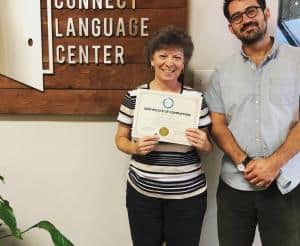
Earlier this winter, Cindy championed our “Resilient” sewing career training course by generating client interest among the refugee ladies she had befriended. With the Covid-19 outbreak, the in-person sewing classes are temporarily on hold, but for Cindy, it was just another opportunity to trust God.
When the Safer-At-Home orders went into effect, Cindy committed the women in this sewing program to prayer. One night, she found a YouTube video explaining how to sew facemasks to help protect against the virus. She shared this video and by the next day, two of her refugee friends in the program were hard at work sewing masks for themselves, their families, and others. She shared that the women lit up at the opportunity to sew these masks and have greatly enjoyed doing so over the past several weeks. Cindy has also helped deliver these masks to those who have asked for them. Through her faithfulness, Cindy has stimulated a meaningful at-home activity that has blessed hundreds of people across this city.

When asked for reflections about her volunteering experiences with us, Cindy shared the following: “What God is doing in my life with these refugees, it has been the hugest joy in my life. I’ve known the Lord since I was 26 and have had a lot of ups and downs since then. But this has been one of the most fulfilling things I’ve ever done.”
In a time of bleak circumstances and increasing uncertainties, knowing we have ultimate security in God and his divine plan is a comfort we should never take for granted. Thankfully, we have people like Cindy who have shown us beautiful things that come by prayerfully looking for the path the Lord has invited us to follow. Her willingness to search for refugee neighbors to welcome and serve have brought about transformation in both her life and theirs.
By Nathan Spencer
(Read another volunteer spotlight story HERE.)
===============
Join World Relief Memphis HERE as we respond to the local impact of the COVID19 Crisis, equipping and coordinating volunteers and churches (like Cindy) seeking to love their neighbors by responding to urgent refugee and immigrant community needs. Want to learn more about volunteering? Learn about our current volunteer opportunities HERE.
Rodney: Responding to the Call to Love and Serve (Part 1)
Being willing to change our perspectives and opinions is never easy, even when a person wants to be open to discerning God’s will. Human nature pushes against His pulling, yet it is possible for the callousness of our hearts to regain their softly supple state, showering others in compassion and love. In anticipation of Volunteer Appreciation Week, I was able to capture the story of one of our incredible volunteers: Rodney. His story demonstrates how the penetrating love of God can pulverize our preexisting perceptions and plans for our own lives, pulling us along His perfectly designed path. Sometimes, all it takes is a little push in order to respond.
Rodney began volunteering for World Relief Memphis in Spring 2019, but prior to this, was unsure of his level of comfort with refugees and immigrants in this country. “Well, I kinda got to the point to where (I felt), we need to stop people from coming into the US because they are coming in illegally, and you’d see the big headlines saying that an illegal alien broke into someone’s house or you hear something about MS13 without context. You get to the point where you start to put people into the same category.”
He recalled first having cause to question this when WRM’s ministry partner David Frazier spoke at Rodney’s church, First Evangelical Church. “My son heard (him) speak. There was a little questioning of what he believed about refugees and should the wall be built? When James came and told me what (David Frazier) had said, I invited him to come to my Sunday school class to speak on that. And he really pulled back and showed me the facts about who refugees really are and what processes in terms of vetting and stuff like that that they do go through.”
From there, David recommended he take our two introductory orientation programs at World Relief. These classes, coupled with encouragement from David, peeled back Rodney’s views and revealed who forcibly displaced immigrants truly were.
“The first thing that really got to me was the young lady who led the first class. She gave out index cards and we wrote different things on them like clothes, or house, or something like that. Then you had to go through and eliminate what was less important than other things until you got down (to just a little). Then you realize, this is what these refugees have had to do. They’ve had to give up things in order to (strive for) a better life or escape danger where they were. It just made me think, what would I have to give up? It gave me a respect for people who have made the choices they have made and opened my eyes up to the fact that the people that are here are not trying to – as my son puts it – stay in their own groups. They are trying to learn English, trying to assimilate, and trying to get jobs. These aren’t people coming just to get something, they’re coming to learn: they are coming to contribute.”
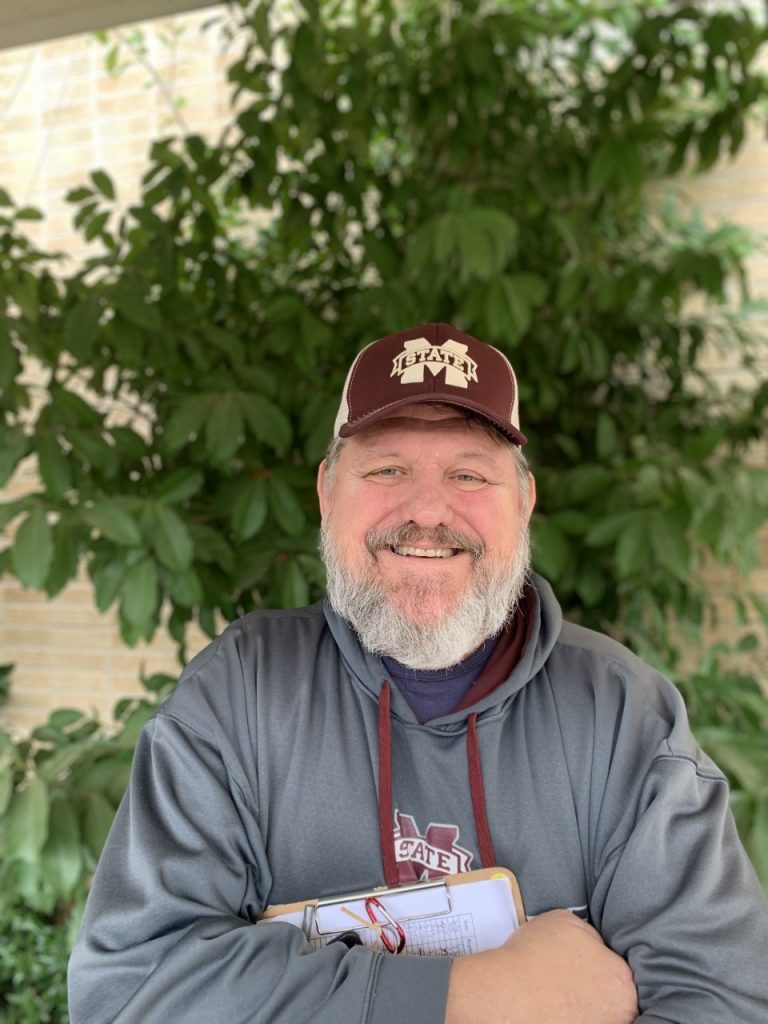
After the classes, Rodney immediately felt compelled to begin his journey as a volunteer. Starting on Wednesday nights at the Connect Language Center’s Café English conversation sessions (pictured above), he began to make connections and experience the beautiful personalities of our refugee and immigrant program participants in person. He described fondly how he began to laugh and joke with the people there and felt a palpable sense of shared humanity and love for each other. Tugged by the weight of God’s planning, he signed up for Thursday nights as well, immersing himself further into the lives of these new neighbors.
This is only the beginning of Rodney’s volunteer story, but already serves as a stark reminder of the love and compassion God calls us to have towards all people. After being pushed by a man he respected, God’s path opened clearly for Rodney to step through. And he still continues to step deeper into even stronger new relationships! (To read Part 2, click HERE)
By Nathan Spencer
===============
Join World Relief Memphis HERE as we respond to the local impact of the COVID19 Crisis, equipping and coordinating volunteers and churches (like Rodney and First Evan) seeking to love their neighbors by responding to urgent refugee and immigrant community needs.
Rodney: Responding to the Call to Love and Serve (Part 2)
This is the second of a two-part installment. Read Part One of Rodney’s story HERE.
Freshly immersed in Café English, Rodney quickly fostered friendships with our English as a Second Language (ESL) students. Shortly after this routine was established, he was approached by Mobilization Director Karen Spencer to potentially fill the need of Roadrunner: volunteer drivers who transport our refugee and immigrant program clients to and from ESL classes and a variety of necessary appointments. Without hesitation, Rodney said yes! Shortly after being trained, he began driving World Relief’s 15-passenger van on the ESL route three days per week. According to Rodney, this was simply the next step God planned for him to take after he asked for his heart to be opened. Through his time transporting program participants, new perspectives about immigrants and refugees have been reinforced, he has made life long memories, and fostered friendships that will forever impact his life.
Rodney readily shared some of his fondest and impactful memories so far.
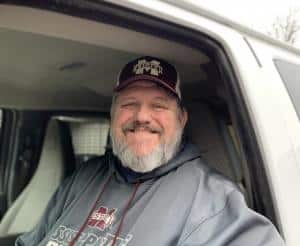
“One of the first groups of ladies I was driving home (from ESL classes) came close to my 29th wedding anniversary. So I asked them to teach me how to say ‘I love you’ in Swahili, which is ‘nakupenda.’ It was a way to reach out to them with things from my life and incorprate it into theirs. And they just laughed more than anything and loved it. Later on, when they started leaving (the van), we would say ‘nakupenda’ to each other as a sign of our friendship.”
This is a small glimpse into the joy Rodney brings to our friends when he picks them up from classes. As I have witnessed personally, our clients light up when they see him because of his concerted effort to learn their names and help them work on their English by basic, but meaningful conversations about their lives.
These relationships fostered along his routes have now quickly extended into his regular life and beyond the reaches of our programs. Rodney met the Mto brothers when he took them home one week. After exchanging basic formalities, he asked questions in following drives about their lives: who was married, what were their hobbies, etc. As they grew more comfortable around each other, one of the brothers approached Rodney with a question.
“Close to the end of (their class cycle), one of them said, ‘I want to learn how to drive’. And so I said, ‘okay.’ I went over [to the Connect Language Center], I talked to Richard (WRM’s Education Director), who gave me some books and helped me get them ready to pass their permit test before they could start driving. They practiced and practiced and practiced. Afterwards, I invited them out to my house for some chili. Two came, and I got to know them better. They have now gotten jobs, so they are no longer attending ESL classes. However, they have become friends with me and my son – who is 18 years old.”
Just a couple months ago, Rodney took them out to Incredible Pizza to drive go-karts so they could safely practice driving! While this might seem trivial, this meant the world to the Mto brothers and is a big step towards integration for them as new residents in Memphis.
Before we closed our conversation I had a few final questions, the first being why he was so willing to serve beyond his initial volunteer commitment. His response was truly inspiring and humbling for me.
“For me, this whole thing has been about being open to God working in my life. In the last two years I have just been praying a prayer that I would hunger and thirst after righteousness, that I would open myself up to God and to new opportunites. So, when he said something about driving, there was the human instinct (in me) that said ‘maybe this is going too far.’ But I said, ‘God, I asked you to make me open so, okay.’ I will continue this friendship as long as God wants me to. Patrick [one of the brothers] just texted me the other day – and my nickname is Big Rod, but he can’t remember Rod, so he just calls me ‘Big’ – and said, ‘Yo… Big, I’m ready to drive!’ And like always, I say ‘okay!’”
(During the COVID19 social distancing measures and our temporary office closure, Rodney continues to serve by picking up and delivering groceries for some of our more vulnerably impacted families. And he still checks regularly with the friends he has made through Cafe English and driving! Listen to brother Lusungu Mto thank “Big Rod” in our Volunteer Appreciation video HERE.)
At World Relief we often talk about the opportunity for mutual transformation. Rodney experienced a significant mindset shift and can attest to personal transformation in just under a year. Because of his willingness to take a leap of faith, he has been blessed by being a source of positivity and friendly welcome for many of our program participants. Although he is not traveling abroad, he describes his work here as being a missionary from home.
“The thing that has gotten me more than anything else, is that there are missionaries that are called by God and go to a certain country. I’m being a missionary here. I’ve met people from Columbia, Venezuela, Guinea, Democratic Republic of the Congo, and I’ve learned these people’s names, I’ve gotten to talk to them, find out about their familes, what they like to cook, etc. Its something that I’ve really enjoyed and it’s ever expanding.”
While of course, bringing God’s love to other parts of the world is critically important, what happens when God is bringing the world to you? Do you push them aside, unwilling to allow them in or see them? Or do you spread God’s love and Gospel, ministering to the nations on your own front doorstep?
Finally, I asked Rodney what he would say to anyone reading this who could be subscribing to his previous way of thinking, or who is on the fence about potentially volunteering for World Relief. He responded candidly.
“It is not so much that you have the ‘skills’ when you come to this job. It is that you open yourself up to God and say, ‘Take everything that I am, and use me for you glory in this position.’ So, it’s all about being open to God. I am reading a book in my men’s Bible study (at First Evan) called Don’t Waste Your Life by John Piper. He says in it, ‘What are the things that you’re involved in in your life? Look at your life and ask yourself if the things you’re doing are making much of Jesus.’ We have an opportunity (here). He has let us know Him and then by being involved with other people, our lives can echo this: ‘Let your light so shine before men that they may see your good deeds and glorify your father in heaven.’ That is what it is all about to me. Be open, and let God use you to be who he created you to be.”
Volunteering is a sacrifice. It is willingly giving up time you could have to yourself or with your family to go into the world and serve. It is about applying discipleship. Not everyone has the opportunity to serve internationally. But we all have a chance to make a difference where we live, and Rodney’s story is a needed reminder of our call to love and serve. He is an example we should all strive to follow.
By Nathan Spencer
===============
Join World Relief Memphis HERE as we respond to the local impact of the COVID19 Crisis, equipping and coordinating volunteers and churches (like Rodney and First Evan) seeking to love their neighbors by responding to urgent refugee and immigrant community needs.
Still Good: Reflections on Good Friday in a Pandemic
Two years ago I was visiting a refugee camp on Good Friday. It was my fourth and final day hiking the trails that connected dusty ridges and sandy ravines. The way was lined with unending rows of square bamboo and tarp huts. I had asked questions, listened to stories, taken photos, and shared hundreds of smiles and handshakes with those who live there. Two aspects of that experience still live with me powerfully today, Good Friday.
The first is how it felt to witness human suffering on an overwhelming scale. Hundreds of thousands of people call that camp home. I walked many miles each day and still only saw a fraction of the camp and was able to speak with dozens of people daily through interpreters. All of them told a variation of the same story: they lived peaceful lives in small villages until one day the military arrived and started burning their homes and shooting people; they ran; it was the last time they ever saw their homes, or many of their loved ones. Now they are stuck living in makeshift housing; food is scarce; residents are not allowed to leave the camp to search for work. Most of the housing doesn’t have electricity and most of the children don’t have schools to attend. Many children didn’t have clothing. The absence of hope was astounding. It felt like there was no future beyond camp or plan for a different life on the horizon. Returning home, integrating into the country where the camp is, resettling in a third country like the USA — none of these felt like viable options. Two years later their situation has not changed.
The first few days wandering those hot dusty hills, I heard stories of trauma that shook me to my core. I found myself praying, repeatedly, “God, where are you?” That’s the same prayer another sojourner prayed many Good Friday’s before: “My God, my God! Why have you forsaken me?” It’s a good prayer. It’s an honest prayer. And it’s a prayer that many of us are praying right now as we witness the unchecked ravages of the Coronavirus. God, have you forsaken us? If that is the only prayer you can muster this Good Friday, then pray it with all you’ve got. You are in good company.
The second aspect of my Good Friday experience surprised me(actually, still surprises me)—I felt a sense of someone’s presence. There were throngs of people everywhere, so it wasn’t just a sense of another person’s physical presence. What I felt was a sense of companionship, of solidarity, and I felt that His presence was not with me but with them. It dawned on me that Christ’s presence was in the camp powerfully—almost tangibly. And it wasn’t that he just showed up when I got there. It was a sense that Jesus had been there all along. A sense that he lived there and it had simply taken me, the outsider, a few days to become aware of it.
When I departed that Friday afternoon, part of me felt sad to leave something of Jesus behind. I realized I had been walking on holy ground. Those dusty trails bustling with barefoot children also bore the footprints of the Son of God. As scripture repeatedly affirms, Christ is close to those who are the least, the lost, the lonely, the suffering. I witnessed it firsthand. I felt it.
Whether you read this as a refugee stuck far from home, or someone stuck inside of your own home, know that you are not alone. The same Son of God who suffered on the cross that first Friday also suffers with you…indeed, he suffers for you. For this reason—even in the midst of a global pandemic—we still call this Friday “Good.”
Mark Finney | 4/10/2020
‘God is a God of Mercy’
How Justin Kalumuna survived a military attack, brought his family to safety and rebuilt his life in the U.S.
Part I: Escaping Violence in the DRC
When Justin Kalumuna left for work one morning in 2011, he wasn’t expecting that day to be the first in his 7-year journey as a refugee.
It was on that day that Justin accepted a new passenger and drove him to an unfamiliar place called Rutshuru. For Justin, a seasoned taxi driver, to be unfamiliar with any area was both a rarity and a red flag. When the man returned, Justin realized he was a soldier.
For nearly 23 years, the Rwandan militia had been terrorizing eastern Congo. As a matter of principle and safety, Justin decided not to drive him again or even to answer his calls. The soldier took this as a personal offense.
“All the time he would call me, I would not like to accept his call or maybe to hire [out] my taxi again,” Justin said. “And he was like, ‘no way.’ So it creates a kind of problem.”
One evening, the soldier showed up at Justin’s house with some fellow soldiers. They kicked down the door of Justin’s house, but found only Justin’s wife, Justine, and their three children.
Justin was at church. A neighbor called to say there was shouting coming from his yard in Lingala, the region’s military language. Justin left the service, hurriedly crossing the short distance between his church and home. A military-grade flashlight flickered to life in his face, and he froze.
“They knocked me down. They started hitting me. I lose the control and they were hitting me with something in my back. I don’t know what was it, but I lost the conscious,” he said.
A U.N. Peacekeeping vehicle on patrol happened to pass by the scene. The soldiers scattered and the vehicle’s high beams illuminated Justin as he lay on the ground, unconscious. Next thing he remembered, Justin woke up in a hospital bed.
“I saw the clothes that looked like hers, and the person was almost her, but she was not looking at me,” he said. “I end up realizing that she’s my wife on the next bed. She was beaten, and she lose conscious and the neighbor took her to the hospital.”
The doctor was as surprised as they were when she learned these two patients in neighboring beds were married. It turned out to be a life-saving realization only moments later when three soldiers appeared at the hospital looking for Justin.
“When the soldiers left me they see I am like died. So they get to hear that I didn’t die, and they came looking for me in the hospital,” he said.
The attackers searched every room. The doctor hid Justin and Justine in a supply closet as the soldiers combed through the hundreds of hospital beds looking for their victims. Justin and Justine were able to escape through the hospital’s back door, run to the neighbor’s house to get the children and flee to Congo’s eastern border. On market day, the family crossed into Uganda.
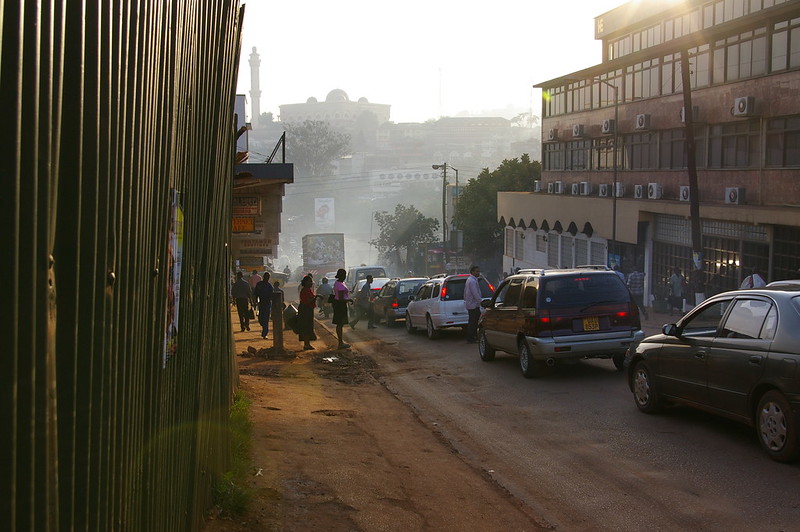
Part II: Life as an Urban Refugee
Once they crossed the border, Justin wasn’t sure what to do next. His only connection in Uganda was a phone number belonging to Emmanuel Bakenga, an old friend with whom he hadn’t spoken in years.
“I tried that number. It was so long since I didn’t talk to him, but I had the number, and the number went through,” Justin said.
Much to Justin’s surprise, Emmanuel not only picked up the phone, but also arranged transportation for all five Kalumunas to join him in Kampala, Uganda’s capital city.
Justin said his life was changed as a result of Pastor Emmanuel’s hospitality. For three months Emmanuel hosted all five Kalumunas, providing for their every need while Justin and Justine nursed their wounds. The Kalumunas also became active members in Emmanuel’s congregation.
“You can work for five years and leave with one friend. Preaching once can give me ten good friends that are more than brothers,” he said.
During their first few months in Uganda, Justin was sorting out the family’s legal status. They had arrived in Uganda as asylum seekers. They were then granted status as urban refugees, a title that means you can live as a resident in a city, instead of a camp. This provides refugees with the autonomy to make money and build a better future.
“Remember, I have a wife and I have also three kids. I have also to start working and learning English, so it was a very harshened life,” he said.
During those next few months in Kampala, Justin sold jewelry. He says people in Uganda like to buy jewelry from the Congolese people, because they think it’s more authentic. At that time, Justin had also enrolled himself in English classes at Jesuit Refugee Service (JRS), eventually learning enough to enroll at Makerere University. He also applied for a highly-sought after position as an interpreter for the UNHCR.
Justin recalls that the initial applicant pool for this position was 96. , was 96. After some written tests, only 30 applicants were left, and following the first interview, there were only 10.
“So I went there for the second interview and I found that people were from the office of the Prime Minister, who was in charge of refugees, and UNHCR staff was also there,” he said. “The NGO who was in charge of all interpreters was all there. There were like seven people, and these are really high-ranked people.”
To say Justin was ecstatic after receiving the job offer would be a severe understatement. It was a great honor, he says, to have been selected from nearly 100 applicants, but it was an even greater honor to serve others in vulnerable situations like his own.
“I knew like people life, what they got through, the struggle,” he said. “You know, me myself, I’m a refugee. I live with people in this community. I understand people.”
Two big things happened next: First, after waiting more than a year, the Kalumunas finally made an appointment for their immigration interview. Second, they welcomed a little one to the family: Chubaka Emmanuel, born December 24.
Amidst the excitement of a new son, Justin was faced with a difficult choice. Emmanuel, the newest Kalumuna, would start his refugee application at step zero. The rest of the family would have to start the process over from the beginning if they wanted to stay together.
It is fairly common for refugee families faced with the same choice to let one family member, usually the father, proceed with resettlement. That way, someone can go get a job, a house, and set up life for the rest of the family when they arrive. But for Justin, the choice to stay together was easy, and having a steady job meant his family could wait a little longer. Not every refugee has that option.
One year later, the Kalumunas had completed and resubmitted their resettlement application, this time as a family of six. They waited through another year for news of resettlement. But in early 2017, the White House issued Executive Order No. 13769, which barred immigration from six countries entirely and halted nearly every refugee case up for resettlement in the U.S. Justin felt like he’d just been sent back to square one.
After that, life in Uganda resumed its normal march: Justin and Justine kept working, the kids continued to attend school. Justin even put a down payment on a car — he was settling in to the idea of life in Uganda.
And then, out of nowhere, the U.S. resettlement list came.
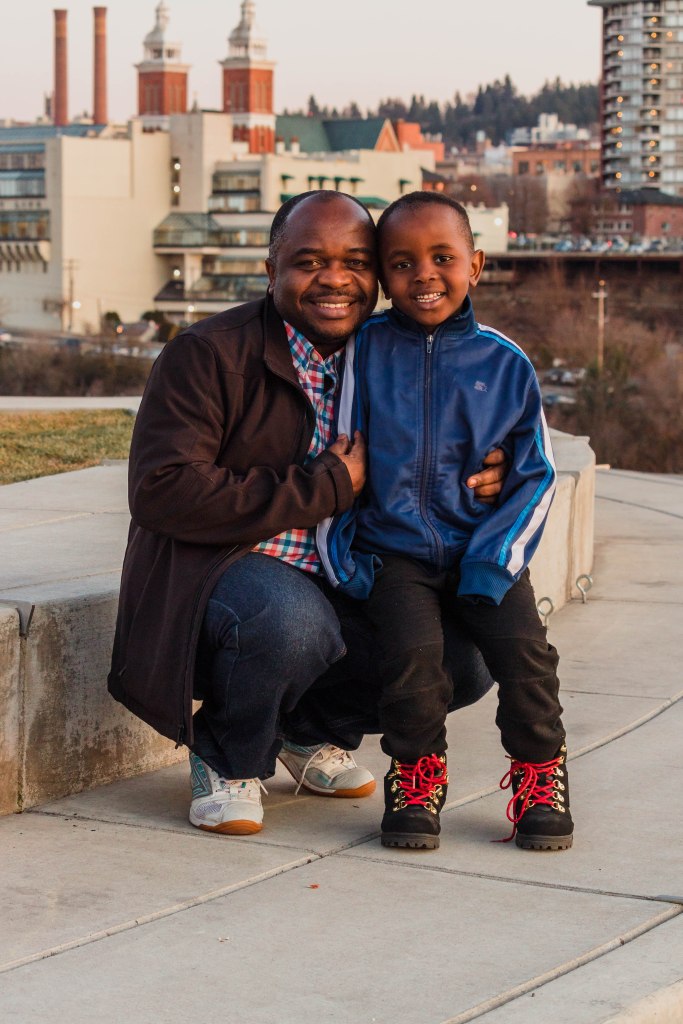
Part III: Life in America as a Former Refugee
Justin still remembers this part play-by-play: It was February 2018. He had just returned from lunch (the same day he bought the car) and went to get some papers off the printer for his boss.
He looked at the papers Justin had just handed him, and found it was the U.S. immigration interview list. Justin casually read the list over his boss’s shoulder. He looked closer and realized Justine’s name was there too, and so were Joyce, Prince, Merveile and Emmanuel’s.
This image has an empty alt attribute; its file name is kalamuna-13.jpg
“Immediately, I felt like all my mind changing and my future changing and everything changing in my mind. Millions of pages was running in my mind, like seeing myself in the United States. And it was a great hope, you know,” he said.
When Justine heard the news, she literally didn’t believe it, and made Justin swear he saw their names with his own eyes.
After that, things went quickly. In March, the Kalumunas met with immigration to prepare their case files. In April, they did the immigration interview. In June, each family member completed the medical examination and security check (for the third time) and in August, the visas arrived.
On the 20th of September, the Kalumunas were on a plane bound for Spokane. When they landed, World Relief staffers were there to greet them. A volunteer family in Coeur D’Alene opened their home, and to this day, Justin considers those first American friends to be as close as family.
From there, Justin and Justine began to settle in. They moved to Spokane and lived with a friend they met in Uganda, Daniel Casigua, who was the secretary at Pastor Emmanuel’s church. After that, they moved into a new apartment, enrolled the kids in school and started to look for work.
Like all new arrivals, Justin and Justine were given the choice to enroll in social services through DSHS or in a program for those ready to work immediately, called Match Grant.
Justin remembers their decision hinging on the long-term guidance that Match Grant offers.
“We just need someone who can connect us with the small things,” Justin said. “We are ready to fly ourselves — me and my wife, we have that confidence and we were ready to fly. So we signed [up for] Match Grant.”
After that, Justin and Justine took off in pursuit of the American dream.
Their first job was with Davenport Hotels. Justin took the housekeeping night shift so that Justine could work mornings. They took opposite shifts taking care of their kids, and Justin remembers quality sleep was rare in that time.
Only a few months into his position, Justin earned a promotion as the night shift assistant supervisor. After seven months with the Davenport on their crazy, sleepless schedule, Justin applied for a job as a living assistant.
He is now a Certified Nursing Assistant (CNA), and is working on becoming a registered nurse; Justine still works for Davenport Hotels. They are currently in the process of buying a house and they own several vehicles, which Justin noted are all paid off. Justin pastors Living Sacrifice Christian Ministries, which just moved into a new building. He loves being able to serve the Spokane community with his church ministry, and is grateful that God has trusted so many friendships to him.
Katherine Bell | 3/9/2020
Welcoming Refugees is Everyone’s responsibility
The first time I celebrated World Refugee Day was June 20, 1997, along with thousands of others in Nyarugusu Refugee Camp, Kigoma, Tanzania. A child at that time, I did not really know what it was for or why people celebrated it. Looking back, I realize that the children’s poems and plays, speeches from the camp community, government leaders, and U.N. officials spread a message of hope and a call to action to the nation and the globe. Since the world’s response to this humanitarian crisis had been effectively crippled, this day helps to create awareness. Telling my own story is part of raising awareness – and that’s why I’m here, writing.
Over the course of my life, I’ve lived in several places and countries – so I didn’t expect to experience anything particularly new or different from what a refugee or an immigrant normally feels upon arrival in a foreign country. But nothing could have prepared me for my experience arriving in Memphis.
It was completely different than I imagined. I was welcomed into a friendly environment that continues to have a huge impact on my life to this day. As a Christian, I was afraid of the challenges that I could face and the impact of living in a secular country could have on my faith. But World Relief, the resettlement agency through which I was resettled in the U.S., connected me with volunteers and other community members who share the same faith. These people opened their arms and homes to me, inviting me to share meals and stories with them. It was a huge contrast: Before being invited to the U.S., I lived in South Africa for about 4 years, and during that time, I never entered a South African friend’s home.
I will confess, I was not greatly impressed by the city or buildings when I first arrived in Memphis. What did impress me was how people welcomed me and the love they showed me. I never felt lost on my first days in the U.S., thanks to the opportunity World Relief gave me to connect and hang out with new friends. They made my transition very smooth, and I am grateful for that.
That said, not everyone has an easy and smooth transition when they move to a new country. The majority of the refugees in my current community in Memphis came from refugee camps, where they lived for an average of about two decades. These camps are like living in an open-air prison. Not only are the medical system, nutrition and education poor, but people there are kept in the dark about almost everything. They have no idea what is going on around the world.
Arriving in the U.S. after spending many years in the refugee camp is a shock. The amount of new information and the pace at which you have to learn it is overwhelming. Some refugees have limited knowledge of the new language and are unable to navigate the public system on their own after the orientation services provided by their resettlement agency end.
Having been once in their position of vulnerability and confusion, I see it as my duty as a human being and a member of their new community to care for and support them as much as I can. It is a means of giving back. It is a means of serving my community. It is a form of showing love. It is a form of showing there is always a place they can run to for help – a hard lesson to learn after living in a refugee camp.
This is what all of us are called to and what all of us should be doing. If you’ve grown up outside a refugee camp or if you’ve lived a comparatively comfortable life in America, it can be hard to imagine how a small gesture of kindness and love can eternally impact the many broken lives out there – but it impacted mine. In fact, gestures like these are one of the reasons I decided to buy a house in Binghampton, the most diverse community in Memphis. I believe that the first step of commitment in serving a community is to live within the community, so that we can strive and face challenges together.
With the world in constant crisis – wars, natural disasters, persecution, famine and the mass migration of refugees resulting from these – it is inhuman to cross our arms and say, “This is not my problem.” If it is not your problem, whose problem is it? It is the responsibility of all of us to care for and offer our support to those who are suffering around the world. Not one refugee desired to be in the situation they are now. They simply wanted to live and be free – just as Americans do.
Twenty-two years after that first celebration in the camp, World Refugee Day remains very important to me. Just like the children in the camp singing their songs and the U.N. officials making their speeches, I raise my voice to tell the world about the refugee crisis and demand a collective response. There will never be a better time to act than now.
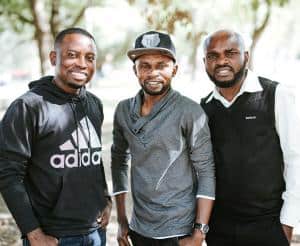
Basuze Gulain Madogo was born in the Democratic Republic of Congo, and first fled with his family for refuge in 1996. He was invited to be permanently resettled in the United States in 2014. Since being welcomed to Memphis, two brothers have joined him here, and two additional brothers have been resettled in Massachusetts and Wisconsin. He was hired by World Relief Memphis as a Resettlement Specialist in 2016, graduated with an Associate Degree from Southwest Tennessee Community College in 2017, and is studying Accounting at the University of Memphis. Join Basuze and World Relief by supporting our work of welcome. Visit HERE to learn more.
If You Plant Early, You Harvest Early
“If You Plant Early, You Harvest Early”
The first son of a large family, Daoud’s father raised him implementing the Afghan Proverb that “if you plant early, you harvest early.” Daoud apprenticed in his father’s trade and was entrusted early with responsibilities in his father’s store. He married young, grew the family business, had children, went back to finish school, and started studying English. Following carefully laid plans, his life was on track: he was beginning to harvest early.
But new conflict and war came to Afghanistan. Daoud’s business suffered and the harvest was no longer abundant. In order to provide for his family, Daoud took a risky job translating for the Coalition Forces. His careful plans to study English proved beneficial, even though those years were fraught with uncertainty. As time went on, it became evident that his family’s safety was precarious. He learned his job with the Coalition Forces made them eligible to apply for resettlement in the United States, so once again, they began making plans. It took two years for all the paperwork, background checks, medical checks, and security clearances to be completed, but Daoud and his family were relieved to receive their Special Immigrant Visas to relocate to the USA, to Memphis. [The U.S. offers a Special Immigrant Visa (SIV) program to individuals who have been employed by or on behalf of the U.S. in countries like Afghanistan and Iraq, and is awarded in recognition of their sacrifice.]
Daoud knew before moving to the United States that America is the land of opportunity and that if he worked hard, they would make it. He remembers the night they arrived in June 2014; they were greeted by World Relief caseworkers, volunteers and new neighbors, all welcoming them. As modeled by his father, Daoud immediately began planting seeds to succeed in the United States. Step one was to support himself and his family financially. He started working full time in a warehouse loading trucks. Although he had skills to do so much more, he understood finding your first job in the United States is not easy and he was determined to do whatever required. Not long after he began working, Daoud had to have major surgery. Even though it was a setback, he sees it as a blessing that he was in the United States when he got sick and was able to receive medical care. Back home it would have gone untreated.
Once Daoud recovered, he began “planting” and working again. He found full-time employment at another warehouse and took on another part-time job. Soon he was able to progress to step two: buying a house. After living in America for only two and a half years, Daoud and his family began to harvest from their plans and hard work. “We have experienced a better life here compared to Afghanistan. For example, our kids are in schools, we own a house, we got our rights, we have vehicles, all positive things that have happened. I am living the American dream. I never thought I could become a homeowner in two years!”
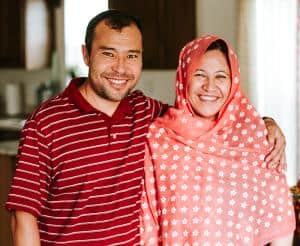
Daoud is continually motivated by his family. “Every parent hopes for their children to get an education, go to college, get a good job. My dream is for them to go to college and get a major that lets them serve the United States and Afghanistan.” He is teaching them to plant early for their future and prays that war does not disrupt their harvest. Daoud has also decided to return to school to complete his bachelor’s’ degree. He knows education is important and is applying what he is teaching his children to himself.
Before arriving in the United States, Daoud was afraid that he would not be able to worship freely here, that it would be challenging to be an immigrant and begin a new life with his family. But resettling in the U.S. was a blessing they never imagined possible. With help from World Relief, intentional planning, planting and hard work, they have adjusted well to life in the U.S. and this new culture – including new freedoms – discovering a community filled with friendship and love. Their journey has been long. Things did not all go as planned, but he and his family are thriving in this new place. They have been able to worship freely and Daoud’s family never take their new freedom for granted. “Freedom is a gift of God for humans,” he reflects. And only four years after setting foot on American soil, his family is harvesting early.
Catherine Gross, World Relief Memphis
Photos by Emily Frazier Creative









